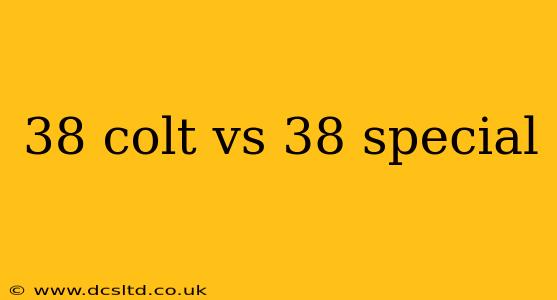The .38 Colt and .38 Special cartridges are often confused, leading to misunderstandings about their capabilities and safety. While seemingly similar, crucial differences exist in their design and performance. This article will delve into the key distinctions between these two cartridges, clarifying their history, ballistics, and implications for firearm use.
What is a .38 Colt?
The .38 Colt, also known as the .38 Short Colt, is an older cartridge that predates the .38 Special. Developed in the late 19th century for revolvers, its relatively short case and lower powder charge resulted in a less powerful round compared to its successor. It's crucial to note that the .38 Colt is significantly weaker than the .38 Special. Firing .38 Special ammunition in a firearm only chambered for .38 Colt can lead to serious damage to the weapon and injury to the shooter.
What is a .38 Special?
The .38 Special, introduced in 1898, addressed some of the limitations of the .38 Colt. It features a longer case, allowing for a larger powder charge and thus a significantly higher muzzle velocity and energy. This translates to greater stopping power and accuracy compared to the .38 Colt. The .38 Special also boasts greater versatility, with a wider range of bullet weights and types available.
What are the Key Differences Between .38 Colt and .38 Special?
The primary differences lie in their case length and resulting power:
- Case Length: The .38 Special cartridge has a longer case than the .38 Colt, enabling a larger powder charge.
- Power: The .38 Special is significantly more powerful than the .38 Colt, delivering greater muzzle velocity, energy, and stopping power.
- Safety: Firing .38 Special ammunition in a firearm chambered only for .38 Colt is extremely dangerous and can cause catastrophic firearm failure. The increased pressure from the .38 Special round can overstress the older design of the .38 Colt chamber.
Can I fire .38 Special in a .38 Colt revolver?
No, absolutely not. This is a critical safety concern. Firing a more powerful cartridge like the .38 Special in a firearm chambered for the weaker .38 Colt is incredibly dangerous and can result in serious injury or death to the shooter and damage to the firearm. The higher pressure generated by the .38 Special can cause the gun to burst.
Can I fire .38 Colt in a .38 Special revolver?
Generally, yes. Most .38 Special revolvers can safely fire .38 Colt ammunition. The .38 Special chamber is designed to accommodate the shorter .38 Colt cartridge. However, it's essential to consult your firearm's owner's manual to confirm compatibility before firing any ammunition.
What are the applications of each cartridge?
The .38 Colt is rarely used today, largely replaced by the .38 Special. Its historical significance is primarily in its role in the development of later cartridges. The .38 Special remains a popular cartridge for self-defense, law enforcement, and target shooting, especially in revolver platforms.
Which is better: .38 Colt or .38 Special?
For modern applications, the .38 Special is unequivocally better. It offers superior power, accuracy, and versatility. The .38 Colt is largely obsolete due to its significantly lower performance and safety concerns associated with using it in a world where .38 Special ammunition is far more readily available.
This comprehensive comparison clarifies the significant differences between the .38 Colt and .38 Special cartridges. Always prioritize firearm safety by confirming your ammunition's compatibility with your specific firearm before firing. Consult your owner's manual and, if unsure, seek guidance from a qualified firearms expert.
